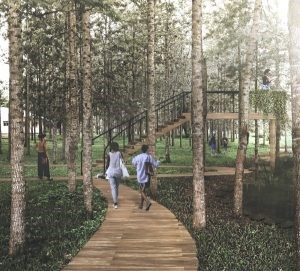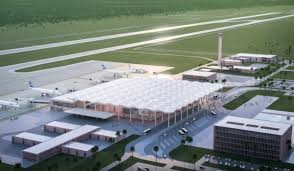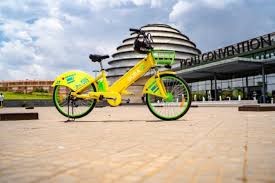Ambient air pollution has risen sharply in recent years, especially in urban centers. Increasing rates of congestion combined with rising levels of personal vehicle ownership and limited public transport infrastructure have resulted in cities in sub-Saharan Africa exhibiting some of the highest levels of PM2.5 particulate matter in the world. Recent research has found that outdoor air pollution causes nearly double the amount of deaths than previously estimated, causing 8.8 million deaths per year. The impact on communities has been profound, with the urban poor being affected the most due to increased exposure to sources of pollutants and limited access to mitigating factors such as green urban space. A 2018 study found that in sub-Saharan Africa, exposure to particulate matter in sub-Saharan Africa led to one in five infant deaths due to non-communicable disease such as acute respiratory infections. With rising populations and accelerating rural to urban migration, cities in Africa are tasked with addressing competing needs for reducing air pollution, investing in public transportation while continuing to foster economic growth.
Air Pollution in Rwanda
The Government of Rwanda has taken several preventative measures to reduce the amount of air pollution by commissioning a study to determine the major sources of air pollution in Rwanda. The Inventory of Air Pollution (REMA 2018) highlighted two primary sources of air pollution: 1) burning of biomass and traditional cooking methods in rural and peri-urban areas and 2) vehicular traffic in urban centers. The study found that from 2012 and 2015, the number of hospital admissions for acute respiratory infections doubled to more than 3.3 million. A major contributing factor to air pollution identified by the study was that 95.2% of cars in operation in Rwanda are currently more than ten years old with less stringent emissions standards than newer models.
In response, the City of Kigali plans to implement a bus rapid transit (BRT) system to improve the speed and efficiency of public transport services. A car free zone has been introduced in the central business district to reduce air pollution in the city center. Car free days have expanded in scope and now take place every two weeks to promote the use of non-motorized transport. The government has also launched the first African Air Quality and Climate Laboratory equipped with the “Medusa system” to measure air pollution and identify sources of greenhouse gases (GHG). Rwanda has also been a leader in addressing the issue of reducing pollutants in the form of hydroflourocarbons (HFCs), which are potent greenhouse gases (GHG) used in the refrigeration and cooling process, through the Kigali Amendment to the Montreal Protocol. In addition to these initiatives, GGGI Rwanda has worked in close collaboration with national government and district-level officials to implement projects that aim to reduce air pollution.
Green & Public Space

With the rapid urbanization of Rwanda’s secondary cities, green and public space has been prioritized to ensure inclusive access to freely accessible urban public space. Increasing accessibility to green spaces and urban tree cover has proven to be an effective means of absorbing harmful pollutants and fine particulate matter and improving ambient air quality in urban areas. The project aims to work with the local and national government of Rwanda through the Ministry of Infrastructure (MININFRA) to increase green and public spaces aligned with SDG 11.7, which sets a target to “provide universal access to safe, inclusive and accessible, green and public spaces, in particular for women and children, older persons and persons with disabilities.”
Increased access to public space has been linked to numerous co-benefits beyond improving air quality including lower stress levels of city residents, reduced urban heat islands, and increased bio-retention of rainwater. As part of the project, GGGI Rwanda has led participatory design sessions to incorporate citizen feedback in the desired features of public space allocated in Huye, Nyagatare, and Rubavu. GGGI Rwanda has also commissioned the University of Rwanda to conduct a comprehensive study of green and public spaces in the six secondary cities of Rwanda. The study will be used to inform urban planning processes in the six secondary cities.
Green Buildings

GGGI supported the Rwanda Housing Authority (RHA) to develop the Rwanda Green Building Minimum Compliance System that also addresses Indoor Environmental Quality (IEQ) in large-scale commercial and public buildings. A total of 29 green building indicators are included in the standards that place a limitation on low-impact refrigerants, encourage greenery protection, avoid the usage of paints and adhesives with high Volatile Organic Compounds (VOCs) that are harmful to indoor air quality. The standards also encourage adequate outdoor fresh air supply to air-conditioned spaces to avoid pollutants that affect indoor air quality. The recently introduced standards also improve energy efficiency by reducing the need for air conditioning by prioritizing natural ventilation.
In addition to the compliance standards, GGGI has also supported the Government of Rwanda in the green design of the New International Bugesera Airport. GGGI Rwanda is supporting the green building certification of the airport in collaboration with the Ministry of Environment and Ministry of Infrastructure. Project activities include the selection of materials with low volatile organic compound (VOCs) and limited formaldehyde compounds in coatings and adhesives in use in the airport. The project aims to limit the amount of pollutants used in the construction and design as part of overall efforts to ensure the airport is compliant to indoor environmental quality standards in addition to water and energy-use efficiency.
E-mobility & Non-Motorized Transport (NMT)

E-bike (gura ride)
GGGI has supported a range of initiatives across the transport sector to emphasize green cities components of access to sustainable services through an emphasis on walking and cycling and recently in the area of e-mobility. GGGI Rwanda completed assessments in secondary cities and conducted stakeholder consultations in Musanze and Rubavu. A local start-up named Gura adopted the survey data into their business plan and will launch a public bicycle sharing (PBS) scheme in Kigali, Musanze, Rubavu, and Huye later this year.
From 2019, GGGI Rwanda has made headway into e-mobility undertaking a gender barrier assessment to look at policies and practices of inclusion in the sub-sector. The project is now incorporating lessons learned from the initial assessment to identify aspects of the broader policy environment and areas of the regulatory framework that could be improved to increase adoption of electric mobility as well as incentive structures to encourage the expansion of e-mobility options in secondary cities. GGGI Rwanda will begin a collaborative project on non-motorized transport in 2020 to contribute towards the upcoming pedestrianization of car-free zones in the City of Kigali and the prioritization of walking and cycling infrastructure in urban centers. The aim of the projects is to reduce vehicular emissions through several means to support a multi-modal transport system with an emphasis on low-carbon options for residents and commuters.
This year’s theme for World Environment Day on June 5th is “Air Pollution”. The three projects described here demonstrate a range of interventions across different sectors that address the root causes of the problem. The projects contribute towards GGGI’s activities under the green cities thematic area, which seeks to ensure sustainable livelihoods through providing green jobs, reducing GHG emissions, and increasing access to sustainable infrastructure and services.
For more information on GGGI’s contribution to reducing air pollution in Rwanda, contact Michelle DeFreese, Senior Green Growth Officer at michelle.defreese@gggi.org.
For information about World Environment Day, visit https://www.worldenvironmentday.global/
Watch the video on GGGI e-mobility partnership in Rwanda https://youtu.be/b9bgf8BZxn8